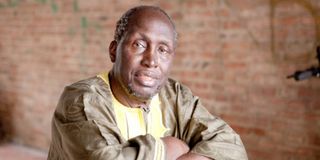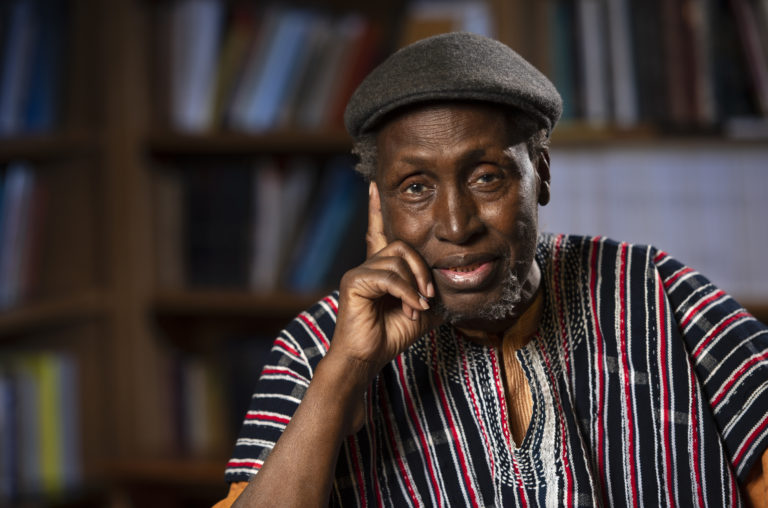Prime
Ngugi wa Thing’o’s death sparks calls to decolonise education

Ngugi Wa Thiong'o, Kenyan writer, Milan, Italy, September 2012. PHOTO | FILE
What you need to know:
- In Tanzania, his novels have long been staples in secondary school and university curricula, sparking thought-provoking discussions in classrooms and beyond.
Dar es Salaam. As the African continent continues to mourn the passing of Kenyan literary giant Ngugi wa Thiong’o, tributes poured in across Tanzania on Thursday from students, teachers, publishers, and authors who described the author as a "literary father" whose works inspired courage, critical thinking, and cultural pride.
Ngugi, who died in the United States on Wednesday at the age of 87, left an indelible mark on the continent's literary and educational landscape.
In Tanzania, his novels have long been staples in secondary school and university curricula, sparking thought-provoking discussions in classrooms and beyond.
“We grew up reading Weep Not, Child and A Grain of Wheat. His books taught us to think critically about colonialism, social injustice and the value of our African identity,” said a literature teacher at Azania Secondary School in Dar es Salaam, Ms Salome Mwasu.
Ngugi’s literature, taught widely across Tanzanian schools, has been part of the Form Three and Form Four literature syllabi for decades, making him a household name among students and teachers. His storytelling, rich in African themes and rooted in indigenous perspectives, helped to shape the intellectual maturity of thousands of learners.
“Reading ‘Devil on the Cross’ changed my understanding of what literature could do. It wasn’t just about entertainment—it was resistance. It was truth-telling,” said a third-year literature student at the University of Dar es Salaam, Ms Neema Charles.
A local author, Mr Maundu Mwingizi said the titan and father of African literature has finally put a full stop to a long and colourful essay of life. “What a loss to the continent.”
“The monumental work he undertook to prepare us, his students – both within and outside the classroom – to continue his work would have been rendered meaningless had he lived on eternally, for we would not have dared the impertinence of opening our mouths in the presence of his mighty pen,” he said.
Thus, “a full stop to his writing is a signal for his students to step up to the plate and begin laying the agenda for their generation.”
The Tanzania Institute of Education (TIE), which oversees school curricula, acknowledged the pivotal role Ngugi’s works have played in nurturing analytical skills and historical consciousness among students.
“Ngugi was one of the few African writers whose works consistently featured in our textbooks. His novels taught generations of Tanzanians not only about colonial history but about standing up for one's language, culture, and rights,” said a TIE official who requested anonymity.
Local publishers also reflected on how Ngugi’s commitment to writing in indigenous languages inspired a shift toward publishing Kiswahili literature in Tanzania.
“Ngugi challenged us to take our own languages seriously,” said Mr Joshua Mmari from Mkuki na Nyota Publishers. “His brave move to write in Gikuyu inspired many Tanzanian authors to write in Kiswahili and other local languages. He showed us that we don’t need the West’s approval to tell our stories.”
An influence beyond the classroom
Many young and upcoming authors in Tanzania say Ngugi’s life and work have been a source of inspiration and direction.
“He taught me that writing is an act of courage. He gave voice to the voiceless. As an aspiring writer, I feel like I owe it to his legacy to tell Tanzanian stories boldly and honestly,” said Irene Komba, a young writer based in Dar es Salaam.
“His death is not just a loss to Kenya, but to Africa and the entire world. We have lost a giant, but his fire lives on in every pen that dares to challenge the status quo,” added Komba.
Ngugi’s lesson to the world was clear: to write fearlessly, to write truthfully, and to write in the languages of one’s people.
His decision to abandon English in favour of Gikuyu was not just symbolic—it was a political and cultural stance that continues to resonate deeply in Tanzania, where Kiswahili remains a unifying national language.
“If there’s one thing Ngugi left us with, it’s the courage to write in our mother tongues and value our own stories,” said a Kiswahili editor at Tanzania Publishing House, Ms Margret Kessy.
Ngugi’s passing has stirred a deeper conversation about decolonising education in Tanzania, with some education stakeholders suggesting increased inclusion of African-authored texts in school syllabi.
“This is the time to look again at what we teach our children. Ngugi reminded us that literature must reflect who we are, not who the world tells us to be,” said an education analyst, Dr John Ndunguru.




